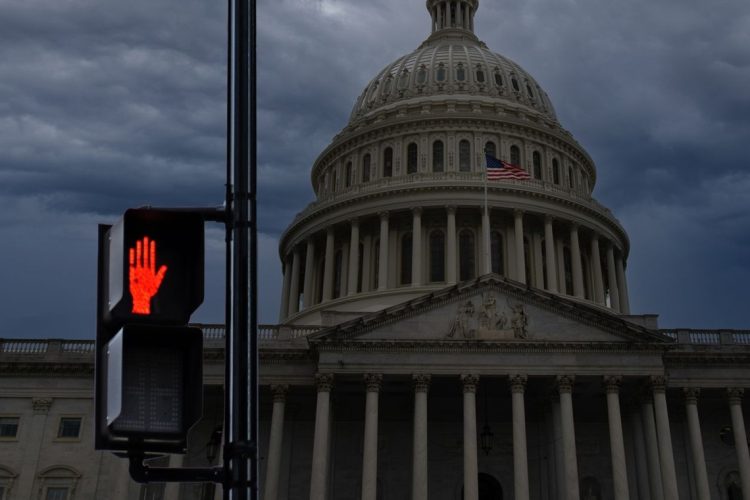As Congress faces off in another government shutdown showdown, trade groups are warning real estate and mortgage professionals to prepare for potential disruptions to their clients’ closings.
If lawmakers can’t agree on a resolution to fund the government by midnight on Wednesday, the government will shut down until a compromise is reached. President Donald Trump threatened a mass firing of federal workers if the government shuts down. This could bring some departmental operations to a screeching halt unless Senate Republicans and Democrats agree on a government spending bill before Oct. 1.
Although Republicans control both the House and Senate, they don’t have the 60 votes needed in the Senate to pass a spending bill. Democrats are refusing to back the Republican-sponsored bill because it lacks key healthcare provisions. Both sides have dug their heels in, making a shutdown more likely as the clock ticks closer to the government funding deadline.
How the housing market will be affected
While the direct hit to real estate transactions may not be widespread, the ripple effects of political dysfunction in Washington, D.C.—and the added economic uncertainty—could put more pressure on an industry already battered by mounting affordability and inventory challenges.
In a statement, Realtor.com® Senior Economist Anthony Smith warned that certain areas with high shares of federal workers would experience the most direct impacts, especially if the shutdown drags on.
“If the shutdown lasts for weeks, the resulting financial strain could weaken home sales,” Smith said. “Over time, this could even contribute to softening home prices in these markets.”
Washington, D.C. Virginia Beach, Virginia; Oklahoma City, Oklahoma; Baltimore, Maryland;, San Diego, California and San Antonio, Texas all have high proportions of federal works and could be disproportionately affected, according to Smith.
According to the Mortgage Bankers Association (MBA), a shutdown might lead to worker furloughs at a minimum—and more widespread layoffs if it’s prolonged—of some employees at key agencies that touch housing. The Office of Management and Budget (OMB) indicated in a recent memo that widespread layoffs are planned if the shutdown proceeds.
Some of these agencies are already reeling from earlier federal staffing cuts, including the Departments of Housing and Urban Development (HUD), Veterans Affairs and Agriculture. Employees at these agencies work with lenders to process FHA, VA and USDA mortgages, which account for roughly 22% of all home purchase loans, according to the National Community Reinvestment Coalition.
Additionally, some verification requirements for conventional loans backed by Fannie Mae and Freddie Mac could take longer or be more difficult to obtain in a shutdown. This includes employment verification for federal employees, verifying tax transcripts from the Internal Revenue Service and verifying Social Security numbers on some loans, according to the National Association of Realtors® (NAR).
The MBA anticipates that most agencies have contingency plans to maintain essential operations during a shutdown. However, a shutdown lasting only a few days would still inconvenience single-family and multifamily mortgage markets, while a longer delay—especially one leading to widespread federal layoffs—would have much more severe and disruptive impacts.
A major concern among housing experts is a potential lapse in the National Flood Insurance Program (NFIP). Unless Congress avoids a shutdown, the program’s authorities will expire on Oct. 1. NAR warns that allowing the NFIP to lapse could put homeowners in flood-prone areas at great risk.
“NFIP supports nearly half a million home sales annually, contributing $70 billion to the U.S. economy and over a million jobs,” NAR Executive Vice President and Chief Advocacy Officer Shannon McGahn said in a statement. “We are taking this critical information straight to lawmakers and working with the administration to ensure that NFIP resources are available and can be deployed during a shutdown. Each day a shutdown continues, the effects on the housing sector grow.”
Smith said that without some shift or relief, the NFIP cannot issue new policies, meaning closing could be delayed.
Properties in flood zones require flood insurance for mortgage approval, and without NFIP authorization, closings could be delayed or derailed entirely. An extension is currently provided in the House-passed continuing resolution, but could be at risk if Senate debate stalls. The MBA said it is actively working with lawmakers on a possible separate authorization measure to prevent market disruptions.
More trepidation in a weary housing market
With White House pressure on the Fed to lower rates even more and an unpredictable tariff policy at play, markets aren’t sure how to make heads or tails of the economy.
Plus, with cooling in the job market and the usual housing market slowdown heading into the final months of the year, a government shutdown could further eat at consumers’ frayed confidence.
“Government shutdowns are disruptive, and the longer they drag on the more disruptive they become,” Realtor.com® Chief Economist Danielle Hale told RISMedia. “Because political brinkmanship is not uncommon, I think it’s reasonable to believe that many consumers are still expecting that leaders will find some way to avoid a shutdown.”
Hale noted a shutdown would interrupt federal workers’ pay, which “would hamper consumer confidence and slow spending, and would likely be felt in regional economies, particularly those with lots of federal workers such as the D.C. metro areas,” she added.
“The housing market would undoubtedly recover, as it has from prior shutdowns, but this unforced error will have consequences for buyers and sellers and the industry,” Hale said.
The housing market already faces headwinds from mortgage rates that, while down from recent peaks, remain elevated compared to the ultra-low rates of recent years. Home prices in many markets stay stubbornly high despite affordability concerns. Adding political dysfunction and economic uncertainty to this mix creates additional hesitation among potential buyers who may already be on the fence.
For sellers, doubt about whether buyers can close deals due to federal loan processing delays may cause some to postpone listing their homes, further constraining already-tight inventory in many markets. This creates a potential downward spiral: fewer transactions mean reduced market activity, which breeds even more wariness and hesitation.
What real estate professionals should do now
The MBA and NAR are working with lawmakers and regulators to minimize disruptions, both organizations said.
In the meantime, here are some things you should do if the government shuts down:
- Communicate proactively with clients, the lender and closing agent about potential delays, especially in transactions involving FHA, VA or USDA loans.
- Verify flood insurance requirements early and ensure NFIP coverage is secured before any lapse.
- Build extra time into closing schedules for transactions involving federal programs.
- Consider conventional loan alternatives where possible for clients with flexibility.
- Stay informed about shutdown developments and agency operations.
A government shutdown’s direct housing impact might be manageable in the short term. However, the unpredictability it creates could further compound affordability headwinds that are sidelining many sellers and buyers.
Editor’s note: This is a developing news story. We’ll update it as new information becomes available.












